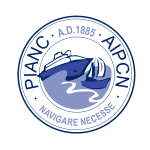Rudder systems – Development of a web-based decision support for the optimized rudder design of inland vessels based on the latest measurement and computational methods
The stricter emission limits for new ship engines and the possible introduction of an energy efficiency criterion for IWT design pose significant challenges for IWT. An individual and holistic view of the interaction of hull, propulsion and steering system – as is common practice for seagoing vessels – does not yet exist in inland navigation. […]
Ruderanlagen – Entwicklung einer webbasierten Entscheidungshilfe zur optimalen Ruderauslegung von Binnenschiffen auf Grundlage modernster Mess- und Berechnungsmethoden
Die strengeren Emissionsgrenzwerte für neue Schiffsmotoren und die mögliche Einführung eines Bewertungskriteriums hinsichtlich der energetischen Effizienz eines Binnenschiffsentwurfs stellen die Binnenschifffahrt vor große Herausforderungen.
BinSmart project has started as of 1 August 2020
Inland shipping, known to be a reliable, safe and environment-friendly transport mode, is essential for a sustainable transport in the future. With approx. 230 million tons of transported goods per year and roundabout four hundred thousand employees a competitive industry and economic prosperity can only be guaranteed by an innovative inland shipping. Securing and even strengthening its ability to compete, research and innovation is crucial for a clean and modern fleet.
Projekt BinSmart zum 1. August 2020 gestartet
Die Binnenschifffahrt gilt als zuverlässiger, sicherer und umweltverträglicher Verkehrsträger, der für einen nachhaltigen Transport unverzichtbar ist. Mit rund 230 Millionen Tonnen transportierten Gütern pro Jahr und annähernd vierhunderttausend Beschäftigten ist eine innovative Binnenschifffahrt Voraussetzung für eine wettbewerbsfähige Wirtschaft und zugleich Garant für wirtschaftliche Prosperität. Damit sie ihre Wettbewerbsfähigkeit behaupten und in Zukunft noch stärken kann, sind Forschung und Innovation für eine moderne und saubere Flotte jedoch unverzichtbar.
BinSmart – Innovative Technologien für die Binnenschifffahrt
Die Binnenschifffahrt steht vor großen Herausforderungen. Unter der Koordination des DST ist das Projekt BinSmart gestartet. Es thematisiert Zukunftsthemen und Innovationen sowie Technologiedemonstratoren rund um die Binnenschifffahrt.
HaFoLa – Versuchszentrum für innovative Hafen- und Umschlagtechnologien
Einrichtung und Inbetriebnahme eines Versuchszentrums für innovative Hafen- und Umschlagtechnologien am DST in Duisburg
DST institute director appointed as member of the innovation commission of federal transport ministry
Prof. Dr.-Ing. Bettar Ould El Moctar, institute director of DST – Development Center of Ship Technology and Transport Systems and Chair of the Institute of Ship Technology, Ocean Engineering and Transport Systems of the University of Duisburg-Essen, has been appointed as one of 16 members of the innovation commission of the German Federal Ministry of […]
DST-Institutsdirektor Prof. Dr.-Ing. el Moctar berät Innovationskommission des BMVI
Als einer von insgesamt 16 Experten ist Prof. Dr.-Ing. Bettar Ould el Moctar, Institutsdirektor des DST – Entwicklungszentrum für Schiffstechnik und Transportsysteme e. V. und Inhaber des Lehrstuhls für Schiffstechnik, Meerestechnik und Transportsysteme an der Universität Duisburg-Essen, in die Innovationskommission zum Innovationsprogramm Logistik 2030 des Bundesministeriums für Verkehr und digitale Infrastruktur (BMVI) berufen worden.
Space@Sea – Systemtests mit schwimmenden, modularen Plattformen
Für zwei Wochen im Januar 2020 standen schwimmende Plattformen im Fokus der Untersuchungen am DST. Seegangsversuche im Flachwassertank dienten der Analyse von entwickelten Teilsystemen des Forschungsvorhabens Space@Sea. Das Forschungsvorhaben befasst sich mit dem Entwurf und der Entwicklung eines nachhaltigen, schwimmenden Arbeits- und Lebensraums.
Space@Sea – Subsystem demonstration for standardised floating platforms
For two weeks in January 2020, extensive model testing of the Space@Sea concept took place at DST’s shallow water basin. The project aims to design multi-use, affordable and standardised floaters that can be assembled to large platforms with arbitrary sizes. Those platforms can serve different functions and applications, e. g. farming applications, living of humans at […]



